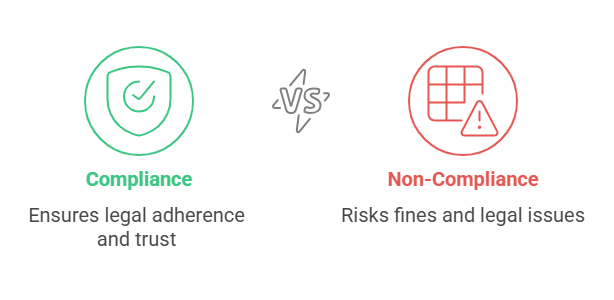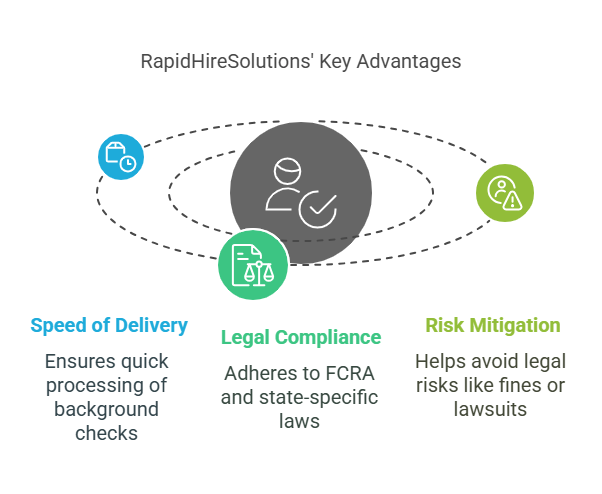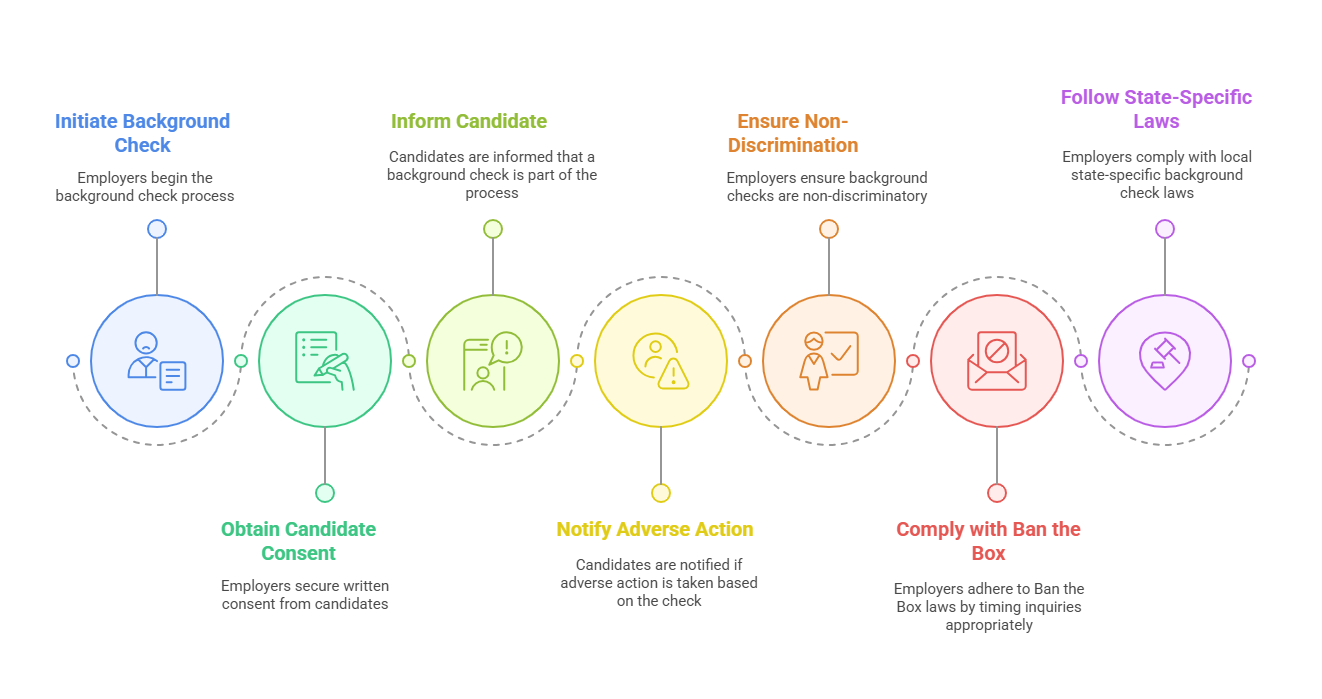Introduction to Screening Compliance Laws in 2025
Screening compliance laws are crucial for employers to ensure that background checks are conducted lawfully and fairly. As the hiring landscape evolves, compliance with these laws becomes increasingly important. In 2025, staying up-to-date with these regulations is essential to avoid costly mistakes, lawsuits, and reputation damage.
HR professionals need to follow the legal framework that governs background checks to protect both candidates’ rights and the integrity of the hiring process. Non-compliance can lead to fines, legal action, or even wrongful hiring decisions. Therefore, understanding key screening compliance laws is vital for companies looking to hire responsibly and legally.
Key Screening Compliance Laws You Need to Know in 2025
Several compliance laws are shaping the background screening process for employers in 2025. Here’s an overview of the most important ones:
- Fair Credit Reporting Act (FCRA) 🏛️
The FCRA regulates how background checks can be conducted and what information can be obtained. It ensures that employers only collect and use information relevant to the hiring decision and provides candidates with transparency throughout the process. - Ban the Box Laws 🚫
These laws prevent employers from asking about criminal history too early in the hiring process. This promotes fairness, giving candidates a better opportunity to showcase their qualifications before criminal background checks are conducted. - Equal Employment Opportunity Commission (EEOC) Guidelines 🧑⚖️
The EEOC ensures that background checks do not result in discrimination against candidates based on race, color, national origin, sex, disability, or religion. Employers must follow these guidelines to ensure equal opportunities for all applicants. - State-Specific Laws 📜
Many states have introduced their own laws to regulate background checks, such as the California Consumer Privacy Act (CCPA) or New York’s Fair Chance Act. These laws vary significantly and require employers to ensure compliance on a state level. - Data Protection Regulations 🔐
With data privacy concerns growing, regulations like the General Data Protection Regulation (GDPR) apply to employers conducting international background checks. These laws govern the collection, storage, and sharing of candidate data to protect their privacy.
Why Compliance Matters in Background Checks

Non-compliance can have serious consequences, including hefty fines, lawsuits, and damage to an organization’s reputation. Employers must partner with background check providers who comply with the latest screening laws to avoid these risks.
A trusted provider will ensure adherence to laws and provide clear documentation and processes that protect both the employer and the candidate. Compliance guarantees that the background screening process remains transparent, fair, and legally sound, which ultimately fosters a trustworthy and secure hiring process.
Data Table: Key Screening Compliance Laws in 2025
| Law | Description | Key Requirement for Employers |
|---|---|---|
| Fair Credit Reporting Act (FCRA) 🏛️ | Governs the collection of information from credit reports, criminal records, and other personal data used in background checks. | Must provide candidates with a written notice before conducting a background check and obtain written consent. |
| Ban the Box 🚫 | Prevents employers from asking about criminal history on job applications until later in the hiring process. | Employers must wait until after the initial interview or conditional offer to inquire about criminal history. |
| EEOC Guidelines 🧑⚖️ | Ensures background checks do not discriminate based on protected categories such as race, gender, or disability. | Employers must ensure that background checks are applied consistently and equitably to all candidates, with a focus on job-relatedness. |
| State-Specific Laws 📜 | States like California and New York have their own specific regulations, such as the CCPA and Fair Chance Act. | Must ensure compliance with state laws in addition to federal regulations, particularly regarding candidate privacy and fair chance hiring practices. |
| Data Protection Regulations 🔐 | Includes GDPR and similar privacy laws that protect candidates’ personal data, especially for international hiring. | Employers must obtain explicit consent before collecting, processing, or sharing personal data, and ensure that they are storing it securely and within legal parameters. |
Comparison: RapidHireSolutions vs. Competitors in Compliance
As the landscape of hiring becomes increasingly complex, choosing the right background screening provider that ensures full compliance with screening laws is crucial. Below is a comparison of RapidHireSolutions and its competitors, focusing on compliance with the critical laws for 2025:
Pros & Cons Table
| Key Features | RapidHireSolutions ✅ | Competitors ❌ |
|---|---|---|
| FCRA Compliance 🏛️ | ✅ Fully compliant with FCRA, providing transparency in the hiring process. | ❌ Often slow to update practices with changing regulations. |
| State-Specific Regulations Compliance 📜 | ✅ Adapts to state-specific laws such as CCPA, Fair Chance Act, and others. | ❌ May not fully comply with every state’s unique requirements. |
| Data Protection & Privacy 🔐 | ✅ Strict adherence to GDPR and other privacy laws, ensuring candidate data protection. | ❌ Varies in levels of data protection; may lack international privacy safeguards. |
| Speed of Processing ⏱️ | ✅ Delivers compliant background checks within 24 hours. | ❌ Typically takes 15 to 20 days to process background checks. |
| Customer Support & Legal Guidance 🧑⚖️ | ✅ Offers expert guidance on compliance issues with HR teams. | ❌ May lack dedicated legal support and updates on compliance matters. |
Overview of RapidHireSolutions Services for Compliant Background Checks
RapidHireSolutions stands out as a leader in offering fast, reliable, and compliant background screening services. They have a proven track record of ensuring that background checks adhere to the evolving legal standards, including FCRA, state-specific regulations, and privacy laws like GDPR.
RapidHireSolutions helps employers stay on top of the 2025 compliance changes, with services tailored to meet the specific needs of each organization. Their system integrates seamlessly with existing HR workflows, making the hiring process faster and more efficient without compromising compliance. Employers can be assured that their background checks are not only comprehensive but also fully aligned with current legal requirements.
Compliance Time Comparison Data Table
| Service Provider | Average Turnaround Time | Compliance Assurance |
|---|---|---|
| RapidHireSolutions ✅ | 24 hours | Full compliance with FCRA, state-specific laws, and data protection regulations. |
| Competitors ❌ | 15 to 20 days or more | Compliance may vary, with delays in processing and updating practices with legal changes. |
RapidHireSolutions offers a significant advantage by delivering compliant background checks in just 24 hours, ensuring quicker hires without sacrificing quality or compliance. This is especially valuable for employers needing to fill positions swiftly while staying aligned with legal requirements.
Analysis of RapidHireSolutions’ Advantages
When employers need fast and legally compliant background screening, RapidHireSolutions offers unmatched benefits. Their speed of delivery ensures that background checks are processed quickly, allowing employers to make timely decisions without waiting for weeks. Additionally, RapidHireSolutions’ adherence to legal standards — including FCRA, state-specific laws, and data privacy regulations — guarantees that employers avoid potential legal risks, such as fines or lawsuits for non-compliance.

Employers can feel confident knowing that RapidHireSolutions is proactive in maintaining the most up-to-date legal knowledge, offering crucial legal guidance to HR teams. This not only streamlines the hiring process but also reduces the risk of compliance errors.
In-Depth Pros and Cons Analysis
To further help employers make an informed decision, here’s a deeper look at the pros and cons of using RapidHireSolutions for background checks compared to competitors:
4 Key Pros of RapidHireSolutions:
- Speed and Efficiency ⏱️: RapidHireSolutions processes background checks in 24 hours, allowing employers to make quick hiring decisions.
- Comprehensive Compliance 🏛️: Fully adheres to the latest FCRA, state laws, and GDPR, ensuring legal safety at every step.
- Data Protection 🔐: Implements strict data security protocols to protect candidates’ personal information.
- Expert Legal Guidance 🧑⚖️: Offers direct support from legal experts to help navigate complex compliance issues.
4 Key Cons of Competitor Services:
- Slower Processing Times 🕐: Competitors can take 15 to 20 days or more, delaying the hiring process.
- Variable Compliance ⚖️: Competitors may not always stay up-to-date with changing state-specific laws and data protection regulations.
- Weaker Data Security 🔓: Some competitors may not provide adequate data protection, increasing the risk of data breaches.
- Limited Legal Support 🧑⚖️: Competitors may not offer the same level of legal guidance, leaving HR teams to navigate compliance alone.
This analysis highlights why RapidHireSolutions is a top choice for employers looking to conduct fast and legally compliant background checks. With a robust compliance framework and rapid turnaround times, RapidHireSolutions ensures both efficiency and peace of mind for HR teams navigating the legal complexities of background screening in 2025.
Legal Responsibilities of Employers in Conducting Background Checks
In 2025, employers conducting background checks must adhere to a range of legal requirements that govern the use of such checks during the hiring process. Non-compliance with these laws can result in significant legal consequences, including fines, lawsuits, and reputational damage. Below are the key compliance laws and responsibilities employers must follow:

Fair Credit Reporting Act (FCRA) 🏛️
The Fair Credit Reporting Act (FCRA) is one of the most important laws regulating background checks. It sets forth clear guidelines on how employers can obtain and use background information about job candidates. Under the FCRA:
- Consent: Employers must obtain written consent from the candidate before performing a background check.
- Disclosure: The candidate must be informed that a background check is part of the hiring process.
- Notification of Adverse Action: If an employer decides not to hire a candidate based on the findings of the background check, they must notify the candidate and give them the opportunity to dispute the information.
Failing to comply with the FCRA can lead to lawsuits and fines, so employers must ensure that they follow every step outlined by the law when using background checks in the hiring process.
Equal Employment Opportunity Commission (EEOC) Guidelines ⚖️
The EEOC provides guidelines on how background checks must be used to avoid discrimination in hiring. Employers must ensure that the use of background checks does not disproportionately affect candidates of a particular race, gender, national origin, or other protected classes.
- Disparate Impact: Employers must ensure that their background check processes do not result in a “disparate impact” on certain groups. This means the screening process must be applied equally to all candidates, regardless of their demographic characteristics.
- Consistency in Evaluation: Employers should have clear, consistent criteria for evaluating background check results to avoid bias in hiring decisions.
Employers who fail to adhere to EEOC guidelines could face discrimination claims, fines, and potential lawsuits, making it essential to integrate fair and non-discriminatory practices when using background checks.
Ban the Box Laws 📋
Ban the Box laws are designed to give candidates a fair chance by prohibiting employers from asking about criminal history on job applications. These laws aim to reduce barriers for individuals with criminal records by ensuring that their qualifications are assessed first, without being automatically disqualified due to their criminal past.
- Timing of Inquiry: Under Ban the Box laws, employers can only ask about criminal records after a certain point in the hiring process, typically after an interview or conditional offer has been made.
- State-Specific Variations: These laws vary by state and municipality. Some places may have stricter laws than others, and employers must ensure they are in compliance with local regulations.
Employers need to ensure that they don’t inquire about criminal history prematurely in jurisdictions where Ban the Box laws apply. Violating these laws can lead to fines and penalties.
State-Specific Laws 🗺️
As background screening regulations evolve, many states have enacted their own laws governing background checks. These state-specific laws can vary widely and may address issues such as:
- California Consumer Privacy Act (CCPA) 📜: In California, the CCPA governs the collection, use, and disclosure of personal data, which includes the information obtained during a background check. Employers must disclose how personal information will be used and give candidates the right to access and delete their personal data.
- New York City Fair Chance Act 🏙️: This law mandates that employers in New York City delay asking about criminal history until after a conditional job offer has been made, similar to Ban the Box laws but with specific regional nuances.
It’s essential for employers to familiarize themselves with the local laws in their respective states to ensure compliance. The failure to do so can lead to legal challenges and damage to the company’s reputation.
Data Protection Regulations 🔐
As background checks often involve the collection of sensitive personal information, employers must also be aware of data protection regulations like the General Data Protection Regulation (GDPR) in the European Union and similar laws in other countries.
- GDPR Compliance: For employers conducting international hiring, GDPR requires explicit consent from candidates before processing their personal data and mandates that candidates have the right to access, rectify, or erase their data.
- Security Protocols: Employers must implement stringent data protection measures to safeguard candidates’ personal information from breaches and misuse.
Employers must ensure that they are in compliance with these data protection laws when conducting background checks, especially if hiring internationally or working with international candidates.
FAQ Common Questions About Background Screening Compliance
What are the key compliance laws employers must follow when conducting background checks?
Employers must comply with several key laws, including the Fair Credit Reporting Act (FCRA), EEOC guidelines, Ban the Box laws, state-specific regulations, and data protection laws like GDPR. These laws ensure that employers use background checks fairly, transparently, and in a legally compliant manner.
How can employers avoid violating the Fair Credit Reporting Act during hiring?
Employers can avoid violating the FCRA by obtaining written consent from candidates, providing disclosures before conducting a background check, and giving candidates the chance to dispute information before any adverse action is taken. Ensuring these steps are followed is crucial to staying compliant.
What is the 'Ban the Box' law and how does it impact background checks?
Ban the Box laws prevent employers from asking about criminal history on job applications. This helps ensure that candidates with criminal records are not automatically disqualified. Employers can only inquire about criminal history after certain stages in the hiring process, like after an interview or conditional job offer.
How does RapidHireSolutions ensure compliance with state and federal regulations?
RapidHireSolutions ensures compliance by staying updated with federal and state laws regarding background checks. Their services integrate seamlessly with compliance requirements, including FCRA, Ban the Box, EEOC guidelines, and state-specific laws. This guarantees that employers can trust their background checks are legally sound.
What are the penalties for non-compliance with background screening laws?
Penalties for non-compliance can include fines, lawsuits, and damage to an employer's reputation. Employers can be sued for violating the FCRA, EEOC guidelines, and other related laws, which can result in costly legal fees and potential settlement payouts.
Conclusion: Why Compliance Matters in 2025
In 2025, the need for strict compliance with background check laws has never been more critical. Employers must ensure they stay updated on the evolving legal landscape to avoid costly mistakes, maintain a fair hiring process, and protect both candidates and the organization. Partnering with a reliable provider like RapidHireSolutions helps ensure that background screening processes are fast, efficient, and legally compliant with all the necessary regulations.
As compliance issues continue to evolve, it is essential that employers stay vigilant about changes in laws, especially in areas like data protection, state-specific regulations, and discrimination. By choosing a trusted provider like RapidHireSolutions, employers can mitigate the risk of non-compliance while still performing comprehensive background checks.

